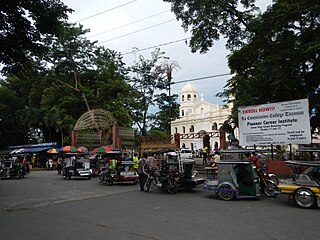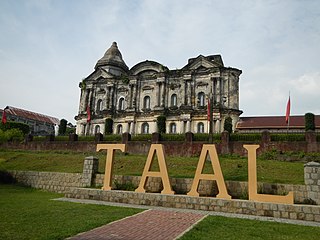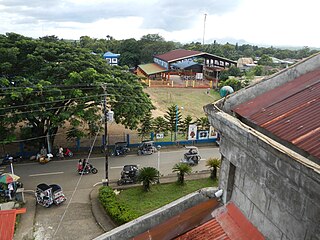
Batangas, officially the Province of Batangas, is a first class province of the Philippines located in the southwestern part of Luzon in the Calabarzon region. Its capital is the city of Batangas, and is bordered by the provinces of Cavite and Laguna to the north, and Quezon to the east. Across the Verde Island Passages to the south is the island of Mindoro and to the west lies the South China Sea. Poetically, Batangas is often referred to by its ancient name, Kumintáng.

A bakery is an establishment that produces and sells flour-based baked goods made in an oven such as bread, cookies, cakes, doughnuts, bagels, pastries, and pies. Some retail bakeries are also categorized as cafés, serving coffee and tea to customers who wish to consume the baked goods on the premises. In some countries, a distinction is made between bakeries, which primarily sell breads, and pâtisseries, which primarily sell sweet baked goods.

Lipa, officially the City of Lipa, is a 1st class component city in the province of Batangas, Philippines. According to the 2020 census, it has a population of 372,931 people.

Talisay, officially the Municipality of Talisay, is a 3rd class municipality in the province of Batangas, Philippines. According to the 2020 census, it has a population of 46,238 people.

Tanauan, officially the City of Tanauan, is a 1st class component city in the province of Batangas, Philippines. According to the 2020 census, it has a population of 193,936 people.

Balayan, officially the Municipality of Balayan, is a 1st class municipality in the province of Batangas, Philippines. According to the 2020 census, it has a population of 95,913 people.

Laurel, officially the Municipality of Laurel, is a 3rd class municipality in the province of Batangas, Philippines. According to the 2020 census, it has a population of 43,210 people.

Malvar, officially the Municipality of Malvar, is a 2nd class municipality in the province of Batangas, Philippines.

Sto.Tomas, officially the City of Sto.Tomas, is a 1st class component city in the province of Batangas, Philippines. According to the 2020 census, it has a population of 218,500 people.

Taal, officially the Municipality of Taal, is a 3rd class municipality in the province of Batangas, Philippines. According to the 2020 census, it has a population of 61,460 people.

Tuy, officially the Municipality of Tuy, is a 3rd class municipality in the province of Batangas, Philippines. According to the 2020 census, it has a population of 46,519 people.

Pandesal, also known as Pan de sal is a staple bread roll in the Philippines commonly eaten for breakfast. It is made of flour, yeast, sugar, oil, and salt.

Fairmount Bagel is a Montreal-style bagel bakery in Montreal, Quebec, Canada in the Mile End neighbourhood of the Plateau-Mont-Royal borough. The first location opened on September 7, 1919 on Saint-Laurent Boulevard by Isadore Shlafman. The current location, on 74 Fairmount Avenue West was opened in 1949. Fairmount Bagel remains a family-run business.

Mexican breads and other baked goods are the result of centuries of experimentation and the blending of influence from various European baking traditions. Wheat, and bread baked from it, was introduced by the Spanish at the time of the Conquest. The French influence in Mexican Bread is the strongest. From the bolillo evolving from a French baguette to the concha branching out from a French brioche even the terminology comes from France. A baño maría, meaning a water bath for a custard type budín or bread pudding comes from the French word bain marie. While the consumption of wheat has never surpassed that of corn in the country, wheat is still a staple food and an important part of everyday and special rituals. While Mexico has adopted various bread styles from Europe and the United States, most of the hundreds of varieties of breads made in the country were developed here. However, there is little to no baking done in Mexican homes; instead, Mexicans have bought their baked goods from bakeries since the colonial period.

Galletas de patatas, commonly sold as egg cracklets, are Filipino biscuits. They are characteristically thick and square-shaped with upturned edges. The name is derived from the curving browned lower edge which resembles a potato. It is also called galletas de huevos due to the use of egg-white glazing, or tengang daga due to its shape.

Uraró, also known as araró or arrowroot cookies, are Filipino cookies made from arrowroot flour. They have a dry and powdery texture and are usually flower-shaped. They originate from the Tagalog people of southern Luzon, particularly in the provinces of Laguna, Quezon, and Marinduque.

Paborita are Filipino disc-shaped biscuits with a flaky texture. They are made with wheat flour, sugar, skim milk, salt, baking powder, alum, and cooking oil. They are very similar in taste to galletas de patatas. They are traditionally eaten paired with hot drinks or with fruit preserves.

Ugoy-ugoy, also spelled ogoy-ogoy, are Filipino layered biscuits. They are typically rectangular or ribbon-like in shape and are topped with granulated sugar. It is particularly associated with the city of Iloilo.

La Bombonera is a restaurant founded in 1902 in San Juan, Puerto Rico, located on 259 San Francisco street of Old San Juan in Puerta de Tierra. It is the third oldest restaurant in Puerto Rico after La Mallorquina founded in 1848 and "Cafè Turull" founded in 1816. Some of its products are Mallorcas, creole version of Majorcan ensaïmades. The current building dates from 1925 and occupies two adjacent buildings on San Francisco Street, numbers 259 and 261. At 259 there is the living room and at 261, on the first floor, you can find the kitchen and the bathrooms in the restaurant.




















